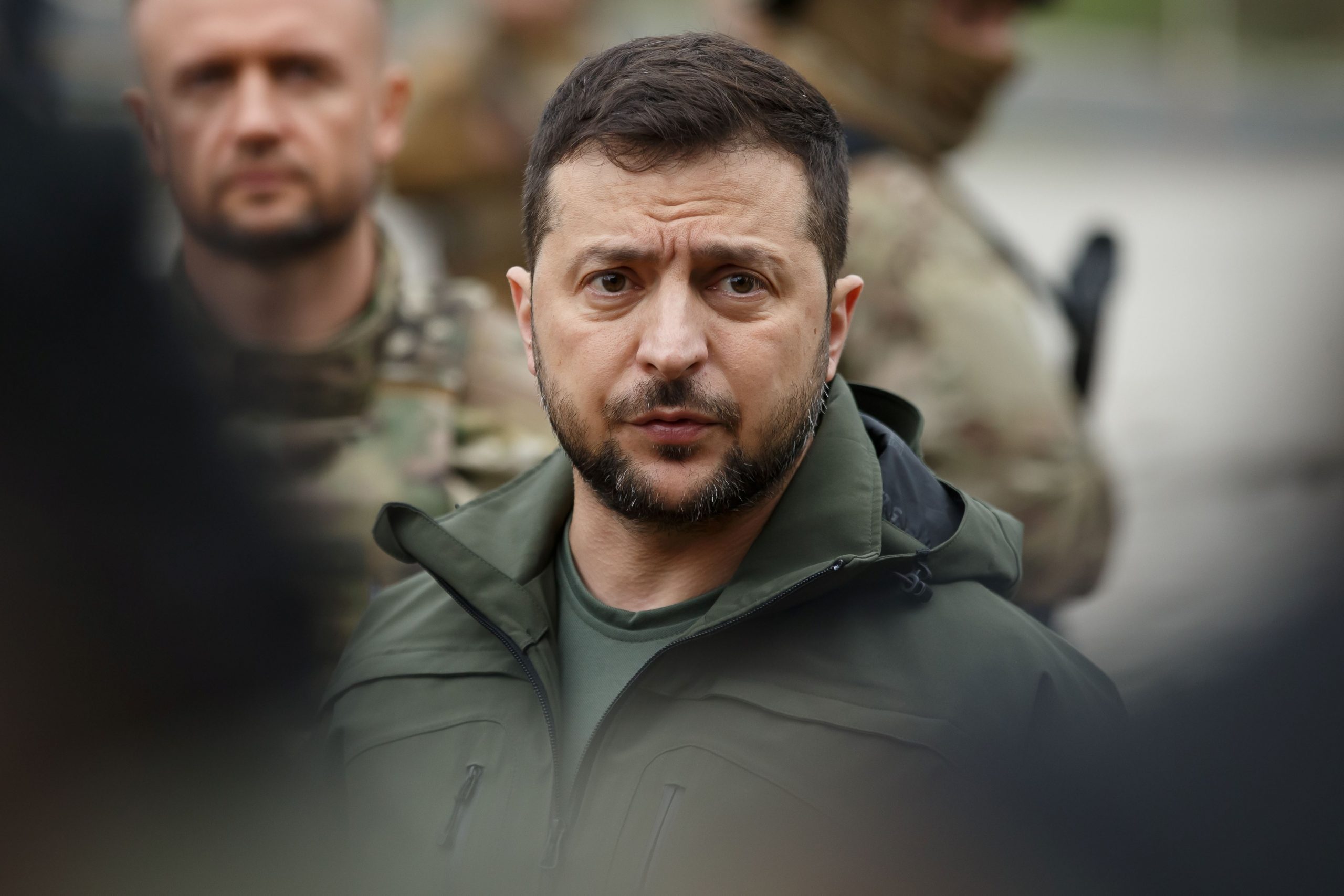Ukrainian President Volodymyr Zelensky will hold high-level meetings in Washington on Tuesday as he faces his toughest test since Russian tanks bore down on Kyiv in late February 2022.
Zelensky will meet with President Biden and Congressional leaders from both parties seeking to help push through an aid package for Ukraine, which has been held up by fighting over funding for security at the U.S.’s southern border.
Zelensky’s visit to Washington, his third since the war began, reflects the existential urgency for Ukraine of maintaining the flow of weapons from the U.S., which has been the country’s primary arms supplier. If Congress shuts off the tap, Ukrainian troops would soon find themselves severely outgunned.
“This is exactly the right time to have President Zelensky in town to have these discussions,” National Security Council spokesman John Kirby told reporters traveling with Biden on Monday, pointing to the continuing negotiations on Capitol Hill over supplemental funding for Ukraine and reports of increased missile and drone attacks by Russia against civilian infrastructure.
Kirby said Biden plans to make clear to Zelensky that the White House is standing firm in its request to provide billions in additional aid to Ukraine. He added that Zelensky is traveling to Washington in response to an invitation from Biden.
Congress’s battle over funding for Ukraine is the most critical in a string of challenges facing Zelensky.
Ukraine’s summer counteroffensive failed to gain back significant territory, despite huge costs in weaponry and casualties, leaving Russia holding nearly 20% of Ukraine’s territory. Political rivals at home have begun to openly criticize him, and polls show his public support, though still high, is falling.
Tension is rising in Europe over aid to Ukraine, with Hungarian Prime Minister Viktor Orbanthreatening to veto an economic package worth 50 billion euros, equivalent to $53.81 billion. Several other allies, where the governing parties have changed since the war began, are also expressing hesitation about continuing to fund Kyiv, another sign of cracks in the alliances that have sustained Ukraine since early in the invasion.
Over the weekend, Zelensky spoke with several European leaders, including Orban, French President Emmanuel Macron and Ursula von der Leyen, president of the European Commission.
“We are counting on a positive decision regarding the allocation of €50 billion and the start of negotiations on Ukraine’s accession to the EU,” Zelensky wrote Sunday on Telegram. “Europe must resolutely defend its values.”
Zelensky is also trying to expand the map of Ukraine’s allies. Over the weekend, he was in Argentina for the inauguration of Javier Milei as the country’s president. It was Zelensky’s first trip to Latin America since the war with Russia began—part of a push to grow support for Ukraine in less-developed regions, where Moscow has wielded more influence than in the West. He met with Milei after the ceremony and wrote on social media that he spoke with several other leaders from the region.
Still, his trip to the U.S. is by far the most meaningful in the short term. The U.S. has supplied roughly half of the military aid to Ukraine, according to the Kiel Institute for the World Economy, and it is unlikely that any other countries could make up the shortfall if Washington pulled back. Many American weapons systems that are already in Ukraine need American ammunition.
Zelensky on Monday told students at Washington’s National Defense University, many of whom have fought in war, that delays on Capitol Hill over funding were only helping Russian leader Vladimir Putin.
“Every one of you here understands what it means for a soldier to wait for munition, waiting for weeks, months, without knowing if support will come at all,” Zelensky said. “Every one of you with command experience knows what it means when instead of moving forward, you’re just watching, waiting for armor or equipment while your enemy is satisfied and preparing for assaults.”
Already, aid from the U.S. has slowed in recent months, leaving some troops short of artillery shells. Whether aid picks up again could determine the next year of the war, said Phillips O’Brien, a professor of strategic studies at the University of St. Andrews in Scotland.
“Ukraine would need to have a different kind of mindset, instead of going toe-to-toe,” he said. “Maybe they let the Russians come down the roads, like they did at the start of the war.”
For Zelensky, there are also political stakes for maintaining U.S. aid. His popularity at home has been based, in significant part, on his success rallying the West around the Ukrainian cause.
Though his approval rating remains high, trust in the president fell to 76% in October from 91% in May, according to the Kyiv International Institute of Sociology, amid the emergence of cracks in political unity.
Zelensky has twice visited Washington in the past year, getting a hero’s reception last December when he addressed Congress and a more muted welcome in September as political divisions over Ukraine aid surfaced.
Zelensky was set to meet Monday evening with White House national security adviser Jake Sullivan, a Biden administration official said. On Tuesday, in addition to huddling with Biden, Zelensky will speak at an all-senators meeting at the invitation of Senate Majority Leader Chuck Schumer (D., N.Y.) and the chamber’s top Republican, Mitch McConnell of Kentucky, a Senate aide said. House Speaker Mike Johnson will also meet him, a Johnson spokesman said. The Louisiana Republican, who voted against Ukraine assistance this fall, has become a supporter since becoming speaker in October.
Write to Ian Lovett at ian.lovett@wsj.com



